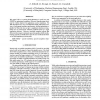Free Online Productivity Tools
i2Speak
i2Symbol
i2OCR
iTex2Img
iWeb2Print
iWeb2Shot
i2Type
iPdf2Split
iPdf2Merge
i2Bopomofo
i2Arabic
i2Style
i2Image
i2PDF
iLatex2Rtf
Sci2ools
ICASSP
2008
IEEE
2008
IEEE
Parsing-based objective functions for speech recognition in translation applications
This paper looks at a parsing-based alternative to word error rate (WER) for optimizing recognition, SParseval, hypothesizing that it may be a better objective for applications such as translation. We find that SParseval is more correlated than WER with human measures of subsequent translation performance, but that optimizing explicitly for SParseval does not give a significant reduction in translation error as measured by automatic methods based on a single translation reference. However, anecdotal examples indicate that SParseval does improve automatic speech recognition (ASR) results, leaving open the possibility that it may be more useful in the future or for other language processing tasks.
ICASSP 2008 | Signal Processing | Single Translation Reference | Subsequent Translation Performance | Word Error Rate |
Related Content
| Added | 30 May 2010 |
| Updated | 30 May 2010 |
| Type | Conference |
| Year | 2008 |
| Where | ICASSP |
| Authors | Dustin Hillard, Mei-Yuh Hwang, Mary P. Harper, Mari Ostendorf |
Comments (0)

